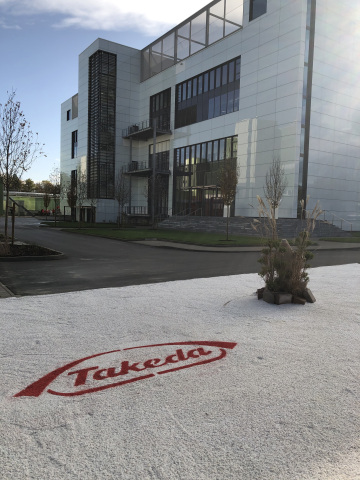New England Journal of Medicine publishes primary endpoint analysis from ongoing Phase 3 study of Takeda’s dengue vaccine candidate
- New England Journal of Medicine publishes primary endpoint analysis from ongoing Phase 3 study of Takeda’s dengue vaccine candidate
- Over 20,000 study participants in dengue-endemic areas in Latin America and Asia received two doses of Takeda’s dengue vaccine candidate or placebo administered three months apart
- Results demonstrated overall vaccine efficacy of 80.2% (12-month follow-up after second dose) against virologically confirmed dengue; exploratory analyses of secondary endpoints showed 82.2% vaccine efficacy among baseline seropositives and 74.9% vaccine efficacy among baseline seronegatives; the vaccine candidate was generally well tolerated with no important safety risks observed to date
- Formal assessment of secondary efficacy endpoints (18-month follow-up after second dose) will be presented later this year; safety and efficacy will be assessed over a total of four and a half years
CAMBRIDGE, Mass. & OSAKA, Japan--(BUSINESS WIRE)-- Takeda Pharmaceutical Company Limited (TSE:4502/NYSE:TAK) (“Takeda”) today announced that results from the primary endpoint analysis of the ongoing pivotal Phase 3 Tetravalent Immunization against Dengue Efficacy Study (TIDES) trial of its dengue vaccine candidate (TAK-003) were published in the New England Journal of Medicine. Takeda’s dengue vaccine candidate demonstrated protection against virologically-confirmed dengue (VCD), the trial primary endpoint, in children ages four to 16 years. Vaccine efficacy (VE) was 80.2% (95% confidence interval [CI]: 73.3% to 85.3%; p<0.001) in the 12-month period after the second dose, which was administered three months after the first dose. Similar degrees of protection were seen in individuals who had and had not been previously infected with dengue based on planned exploratory analyses of secondary endpoints (VE: 82.2% [95% CI: 74.5% to 87.6%] vs. VE: 74.9% [95% CI: 57.0% to 85.4%], respectively). Other exploratory analyses showed a 95.4% reduction in dengue-associated hospitalizations (95% CI: 88.4% to 98.2%). Efficacy against severe disease could not be assessed due to the limited number of cases. Onset of protection was seen after the first dose, with 81% VE (95% CI: 64.1% to 90.0%) between the first and second doses.
This press release features multimedia. View the full release here: https://www.businesswire.com/news/home/20191106005751/en/

Takeda’s new dengue vaccine manufacturing plant in Singen, Germany. (Photo: Business Wire)
Takeda’s dengue vaccine candidate was generally well tolerated, and no important safety risks have been observed to date. The observed safety profile was consistent with results reported in previous studies of TAK-003.1,2,3,4 The TIDES trial will continue to assess safety and efficacy in study subjects for a total of four and a half years.
“The results of this first analysis are very encouraging, indicating that the vaccine could potentially provide important public health benefits against dengue fever and hospitalization,” said Humberto Reynales, M.D., Ph.D., a lead author of the New England Journal of Medicine paper. “It will be important to further analyze the trial results over time in order to assess the long-term efficacy and safety of the vaccine. If longer follow-up data confirm this initial observation, we are looking at a significant step forward in the global fight against dengue.”
“According to the World Health Organization, dengue represents one of the ten biggest global health threats, and it is critical that we have access to a safe and effective vaccine candidate that can reduce the devastating impact dengue fever has in endemic regions,” said In-Kyu Yoon, M.D., Senior Advisor, International Vaccine Institute. “Historically, vaccine development against dengue has been challenging, especially for people who haven’t previously been exposed to dengue, and these results demonstrate protection from dengue fever, including among many participants without prior dengue.”
Serotype-Specific Efficacy
Dengue virus infections caused by all four serotypes were observed in the global TIDES trial. Exploratory analyses of secondary endpoints showed efficacy varied by serotype: VE was 73.7% for serotype 1 (95% CI: 51.7% to 85.7%), 97.7% for serotype 2 (95% CI: 92.7% to 99.3%), and 62.6% for serotype 3 (95% CI: 43.3% to 75.4%). There were too few dengue serotype 4 virus cases to fully assess efficacy at this time (VE: 63.2% [95% CI: -64.6% to 91.8%]).
Further analyses of exploratory endpoints also showed that, for both serotypes 1 and 2, efficacy levels among seropositives and seronegatives were similar. For dengue serotype 3, VE in baseline seropositives was 71.3% (95% CI: 54.2% to 82.0%), and in seronegatives, results were inconclusive but suggested a lack of efficacy (VE: -38.7% [95% CI: –335.7% to 55.8%]). No dengue serotype 4 cases were observed in seronegative participants.
Ongoing Analysis
While in the process of publishing the primary endpoint data, Takeda received additional data from the ongoing TIDES trial, which adds six months of follow-up and provides formal assessment of the secondary efficacy endpoints. Both the primary endpoint analysis and formal assessment of secondary endpoints will be presented at the American Society of Tropical Medicine and Hygiene (ASTMH) 68th Annual Meeting, November 20-24, 2019, in National Harbor, Md., and submitted to a peer-reviewed journal.
“We are excited to share this long-anticipated data from our TIDES trial, which is evaluating the performance of our dengue vaccine candidate in a diverse set of countries across Asia and Latin America, and in a study population that intentionally includes a large proportion of children who had never been exposed to dengue,” said Rajeev Venkayya, M.D., President of the Global Vaccine Business Unit at Takeda. “While more data is needed to fully understand the safety and efficacy profile of TAK-003, these findings strongly suggest that it could help address the massive global burden of dengue in all populations. We look forward to sharing more data in the coming weeks, and engaging health authorities and the scientific, public health and medical communities on these findings, priorities for future evidence generation, and ways we can work together to maximize the reach and impact of this vaccine upon licensure.”
The Phase 3 TIDES trial is ongoing, and longer-term data will be important in determining the efficacy and safety profile, particularly in baseline seronegative participants with dengue serotype 3 virus. Takeda is engaging global health experts to provide insights into the burden of dengue in endemic regions and analyses of results from the trial. Takeda’s dengue vaccine candidate is not currently licensed anywhere in the world.
About the Phase 3 TIDES (DEN-301) Trial
The double-blind, randomized, placebo-controlled Phase 3 TIDES trial is evaluating the safety and efficacy of two doses of TAK-003 in the prevention of laboratory-confirmed symptomatic dengue fever of any severity and due to any of the four dengue virus serotypes in children and adolescents.5 Study participants were randomly assigned to receive either TAK-003 0.5 mL or placebo by subcutaneous injection on Day 1 and Day 90.5 The study is comprised of three parts. The primary endpoint analysis evaluated vaccine efficacy (VE) and safety through 15 months after the first dose (12 months after the second dose).5 The second part of the study continued for an additional six months to complete the assessment of the secondary endpoints of VE by serotype, baseline serostatus and severity.5 The final part of the study evaluates VE and long-term safety by following participants for an additional three years.5
The trial is taking place at sites in dengue-endemic areas in Latin America (Brazil, Colombia, Panama, Dominican Republic and Nicaragua) and Asia (Philippines, Thailand and Sri Lanka) where there are unmet needs in dengue prevention and where severe dengue is a leading cause of serious illness and death among children.5 Baseline blood samples were collected from all individuals participating in the trial to allow for evaluation of safety and efficacy based on serostatus. Takeda and an independent Data Monitoring Committee of experts are actively monitoring safety on an ongoing basis.
About TAK-003
Takeda’s tetravalent dengue vaccine candidate (TAK-003) is based on a live-attenuated dengue serotype 2 virus, which provides the genetic “backbone” for all four vaccine viruses.6 Clinical Phase 1 and 2 data in children and adolescents showed that TAK-003 induced immune responses against all four dengue serotypes, in both seropositive and seronegative participants, and the vaccine was found to be generally safe and well tolerated.1,2,3,4
About Dengue
Dengue is the fastest spreading mosquito-borne viral disease and is one of the World Health Organization’s top 10 threats to global health in 2019.7,8 Dengue is mainly spread by Aedes aegypti mosquitoes and, to a lesser extent, Aedes albopictus mosquitoes. It is caused by any of four dengue virus serotypes, each of which can cause dengue fever or severe dengue.7 The prevalence of individual serotypes varies across different geographies, countries, regions, seasons and over time.7,9 Recovery from infection by one serotype provides lifelong immunity against only that serotype, and later exposure to any of the remaining serotypes is associated with an increased risk of severe disease.7
Dengue is pandemic prone, and outbreaks are observed in tropical and sub-tropical areas and have recently caused outbreaks in parts of the continental U.S. and Europe.7,10,11 Approximately half of the world now lives under the threat of dengue, which is estimated to cause 390 million infections and 20,000 deaths globally each year.7,12 The dengue virus can infect people of all ages and is a leading cause of serious illness among children in some countries in Latin America and Asia.7
Takeda’s Commitment to Vaccines
Vaccines prevent 2 to 3 million deaths each year and have transformed global public health.13 For the past 70 years, Takeda has supplied vaccines to protect the health of people in Japan. Today, Takeda’s global vaccine business is applying innovation to tackle some of the world’s most challenging infectious diseases, such as dengue, Zika and norovirus. Our team brings an outstanding track record and a wealth of knowledge in vaccine development, manufacturing and global access to advance a pipeline of vaccines to address some of the world’s most pressing public health needs. For more information, visit www.TakedaVaccines.com.
About Takeda Pharmaceutical Company Limited
Takeda Pharmaceutical Company Limited (TSE:4502/NYSE:TAK) is a global, values-based, R&D-driven biopharmaceutical leader headquartered in Japan, committed to bringing Better Health and a Brighter Future to patients by translating science into highly-innovative medicines. Takeda focuses its R&D efforts on four therapeutic areas: Oncology, Gastroenterology (GI), Rare Diseases and Neuroscience. We also make targeted R&D investments in Plasma-Derived Therapies and Vaccines. We are focusing on developing highly innovative medicines that contribute to making a difference in people’s lives by advancing the frontier of new treatment options and leveraging our enhanced collaborative R&D engine and capabilities to create a robust, modality-diverse pipeline. Our employees are committed to improving quality of life for patients and to working with our partners in health care in approximately 80 countries and regions.
For more information, visit https://www.takeda.com.
References
1 Sáez-Llorens X, Tricou V, et al. Safety and immunogenicity of one versus two doses of Takeda’s tetravalent dengue vaccine: Interim results of a long-term phase 2, randomized, placebo-controlled pediatric trial in Asia and Latin America. Lancet Infect Dis. 2017;17:615-625. Retrieved October 2019.
2 Osorio JE, et al. Safety and immunogenicity of a recombinant live attenuated tetravalent dengue vaccine (DENVax) in flavivirus-naive healthy adults in Colombia: a randomised, placebo-controlled, phase 1 study. Lancet Infect Dis. 2014;14:P830-838. Retrieved October 2019.
3 Wallace D. Persistence of neutralizing antibodies one year after two doses of a candidate recombinant tetravalent dengue vaccine in subjects aged from 1.5 to 45 years. Presented at 64th Annual Meeting, American Society of Tropical Medicine and Hygiene; October 2016; Philadelphia, Pa.
4 Saez-Llorens X, et al. Phase II, double-blind, controlled trial to assess the safety and immunogenicity of different schedules of Takeda’s Tetravalent Dengue Vaccine Candidate (TDV) in healthy subjects aged between 2 and <18 years and living in dengue endemic countries in Asia and Latin America. Presented at 5th Pan-American Dengue Research Network Meeting; April 2016; Galveston, Texas.
5 ClinicalTrials.gov. Efficacy, Safety and Immunogenicity of Takeda’s Tetravalent Dengue Vaccine (TDV) in Healthy Children (TIDES). 2019. Retrieved October 2019.
6 Huang CY-H, et al. Genetic and Phenotypic Characterization of Manufacturing Seeds for Tetravalent Dengue Vaccine (DENVax). PLoS Negl Trop Dis. 2013;7:e2243. Retrieved October 2019.
7 World Health Organization. Factsheet. Dengue and Severe Dengue. April 2019. Retrieved October 2019.
8 World Health Organization. Ten threats to global health in 2019. 2019. Retrieved October 2019.
9 GuzmanMG et al. Dengue: a continuing global threat. Nature Reviews Microbiology. 2010;8:S7-S16. Retrieved October 2019.
10 KnowltonK, et al. Mosquito-Borne Dengue Fever Threat Spreading in the Americas. The Natural Resources Defense Council (NRDC). 2009. Retrieved October 2019.
11 Chan E, et al. Using Web Search Query Data to Monitor Dengue Epidemics: A New Model for Neglected Tropical Disease Surveillance. PLoS Negl Trop Dis. 20115:e1206. Retrieved October 2019.
12 World Health Organization. Factsheet. Dengue. 2019. Retrieved October 2019.
13 UNICEF. Vaccination and Immunization Statistics. 2019. Retrieved October 2019.
View source version on businesswire.com: https://www.businesswire.com/news/home/20191106005751/en/
Contacts
Japanese Media
Kazumi Kobayashi
kazumi.kobayashi@takeda.com
+81 (0) 3-3278-2095
Media outside Japan
Rachel Wiese
rachel.wiese@takeda.com
+1 617 444 1452
Source: Takeda Pharmaceutical Company Limited
Smart Multimedia Gallery
View this news release and multimedia online at:
http://www.businesswire.com/news/home/20191106005751/en







